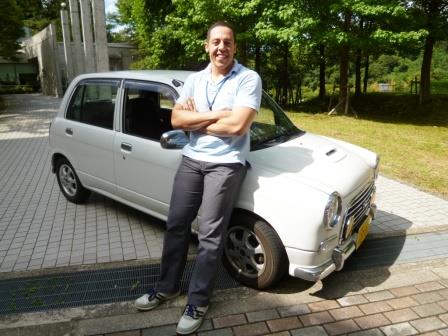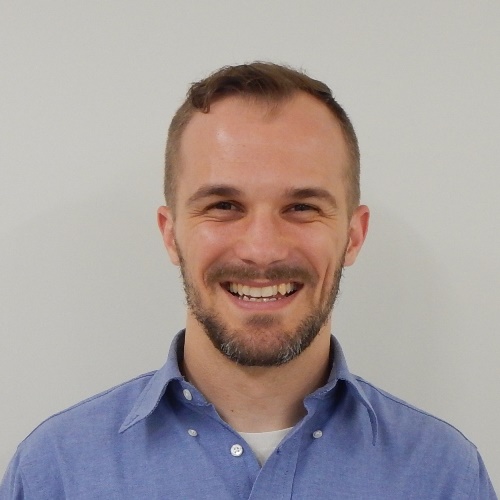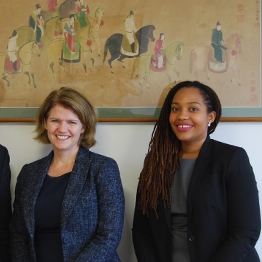KU-GLOCS is the general term referring to various globalization initiatives by Kanazawa University,
including its participation in the Top Global University Project (Super Global Universities).
KU-GLOCS
KU-GLOCS is the general term referring to various globalization initiatives by Kanazawa University,
including its participation in the Top Global University Project (Super Global Universities).
YOU & KU-SGU
"!" and KU-SGU
As Kanazawa University responds to globalization, it introduces a wide range of surprises (!),
unrestricted by existing boundaries.


Kanazawa University Super Global ELP Center
Assistant Professor
James ROSENBERG
In April 2015, the Kanazawa University Super Global ELP Center, which is one of the featured initiatives of the Top Global University Project, was opened. The center, in cooperation with Tufts University ELP (English Language Program), offers three programs: one for the faculty to improve their ability to lecture in English, one for the administrative staff to improve their business English skills and one for the students to prepare for their study abroad, including the TOEFL/IELTS test.
Here is the interview with Assistant Prof. James Rosenberg who has been stationed at the ELP center since this April.
-Your first experience teaching English to foreigners was in 2002. To whom did you teach?
I taught English to workers from Mexico as a volunteer. I was studying Education at a university in Indiana. At that time, many Mexican workers came to Indiana to work at factories and they needed to learn English. There were a few Japanese among them. Most of them were wives of the Japanese workers dispatched to those factories as a manager.
-That’s an interesting experience. Then you came to Japan?
Yes. In 2004, I studied at Waseda University for a year as an exchange student. Then, from 2007 to 2010, I worked as a Coordinator for International Relations in Shichigahama Town, Miyagi Prefecture. Finally, I came to Kanazawa University this April.
-How is the life in Kanazawa? So far, you’ve lived in the regions along the Pacific side of Japan, so you might have difficulty with snow in winter.
I bought a 4WD car as I heard that Kanazawa has a lot of snow in winter. Regarding the temperature, in Boston, where Tufts University is located, the temperature drops to 20 degrees below zero in winter. So the winter temperature in Kanazawa is much warmer than that.
-You’re mainly in charge of the programs for students and administrative staff. Could you tell me about the program for students, which started this April?
I’m really enjoying it. At first, the students were very quiet. However, as they got used to the class, they became more and more active. I try to encourage the students to actively participate in the class by asking them “What do you think about it?” We’ve come through the first semester, and no one has dropped out of the program.
-The students are enjoying your class, too. I’ve heard that if the course is too hard, there are always a few students who drop it. Is there anything else you ask the students to do?
I have them come to my office and have a talk with me at least once a week during the semester. Sometimes students stay for as long as two hours. And some students come to my office even during the summer vacation.
-They are so eager for learning English. Do those students improve their English skills quickly?
Exactly. The class is held only once a week and it’s not enough to improve English skills. So it’s important to do extra study such as studying by themselves and talking with me at my office.
-The program for administrative staff will start in September. It has two courses: Staff TOEIC Course and Staff Business Course. The participants of the TOEIC course are expected to achieve at least 600 pts on the TOEIC after the 4-month program. Do you have any advice for them?
As with students, the class held once a week is not enough. So it’s important to study by yourself. I recommend reviewing the new vocabulary you learn in the class and asking questions. By asking questions, you’ll get more interested in the topic and you’ll learn deeper about the topic. I’d like them to make studying English a priority, even if not a top priority.
-What do you think is necessary for the students to lead the global society in the future?
It’s “Omoiyari,” to care about others.
-What is the reason?
When you work in a different culture or with people from different cultures, misunderstandings inevitably occur. However, if you have “Omoiyari,” it might prevent some of the misunderstandings in advance. Even if they occur, you’ll be able to resolve them with “Omoiyari.”
Of course, English ability is necessary, too. But you don’t necessarily have to be able to speak English fluently. Just try to fully use the English you do know, even if it is elementary level. The important thing is to put what you know into practical use.
-I see. You’ve been actually working in a different culture, so your advice sounds really convincing. Thank you for talking with me today.
(Interviewed in September, 2015)
-

Despite his build, his car is so small!
Look more other posts in this category
-
Tufts University
International Student and Scholar Advisor, Internatiolnal Center
Whitney SULLIVAN -
Faculty of Foreign Language Studies, Institute of Liberal Arts and Science
Associate Professor
Mark HAMMOND -
Tufts University
International Student and Scholar Advisor, Internatiolnal Center
Patrick HIMES -
Tufts University
Office of Student Affairs
Mary Patricia MCMAHON and Nandi BYNOE -
*Taking the program at the Kanazawa University Super Global ELP Center*
Professor, Faculty of Electrical and Computer Engineering, Institute of Science and Engineering
AKITA Junichi




